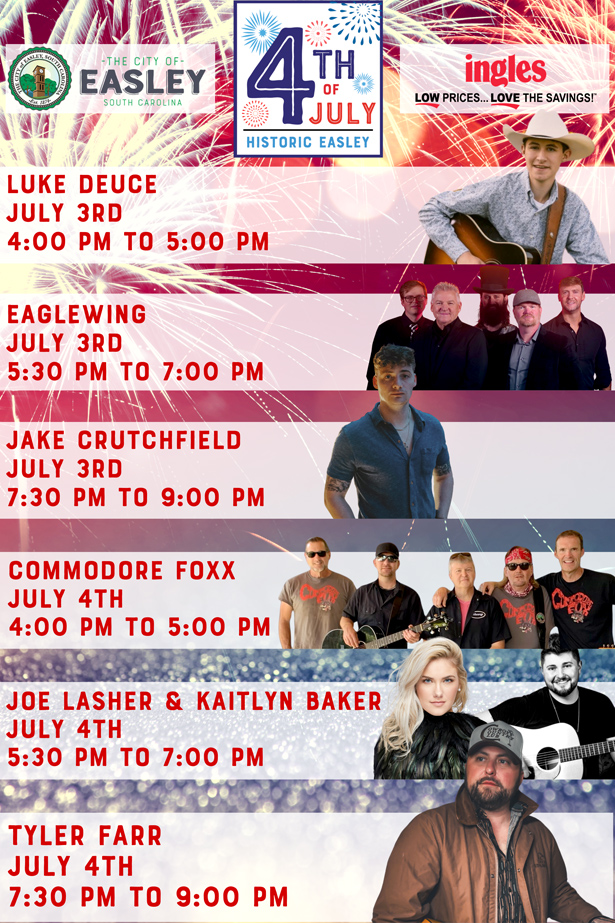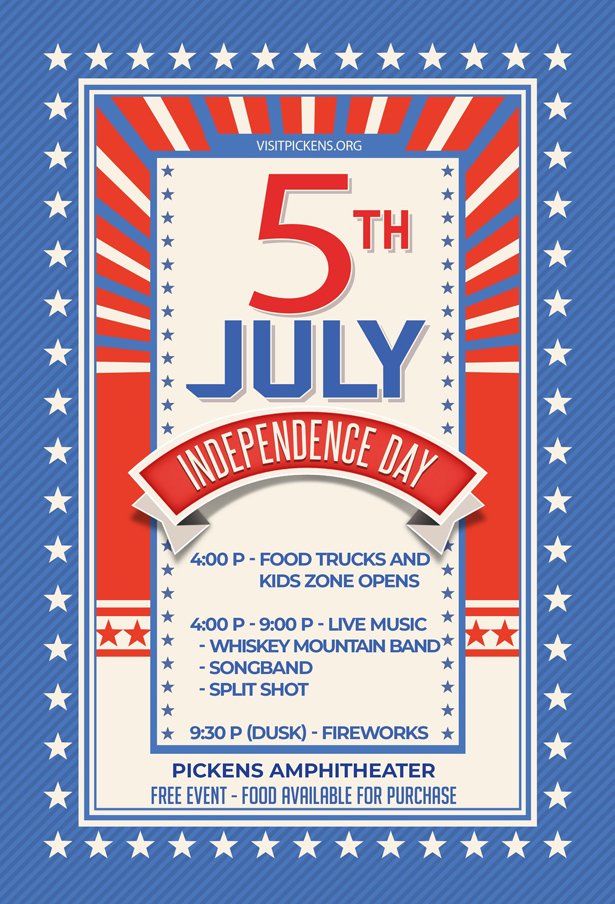Category Archives: Lifestyles
Local municipalities plan Fourth of July events
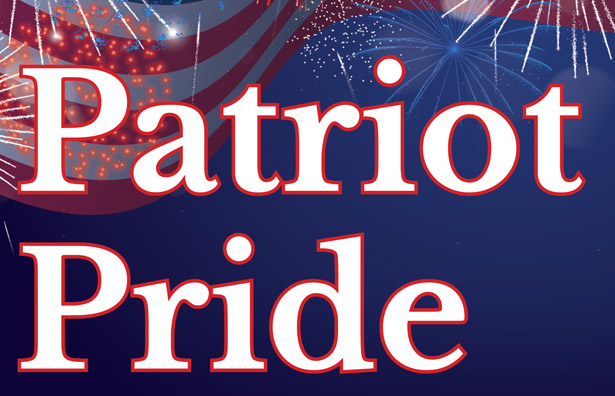
COUNTY — With the nation getting ready to observe its 249th Independence Day, people from around Pickens County will have plenty of places to celebrate over the next few days.
EASLEY
The city of Easley will host the Historic Easley 4th of July Festival for two days of excitement and fun on July 3-4.
The celebration kicks off Thursday, July 3, and continues through Friday, July 4, at Old Market Square. Admission is free, and the event will feature carnival rides, local vendors, food trucks and a fireworks finale.
The July 3 lineup includes performances by Luke Deuce at 4 p.m., Eaglewing at 5:30 p.m., and Jake Crutchfield at 7:30 p.m. Music will run until 9 p.m.
The festivities on July 4 begin at 4 p.m. with Commodore Fox, followed by a joint performance from Joe Lasher and Kaitlyn Baker at 5:30 p.m. Country artist Tyler Farr will headline the evening at 7:30 p.m., with a fireworks display to follow his set.
Th event will also have offerings from food trucks serving various options to satisfy every craving, and visitors are encouraged to check out downtown businesses as they enjoy all the festival has to offer.
LIBERTY
Elsewhere, The City of Liberty is set to host its annual “Love My Liberty” Independence Day celebration on July 4 with an evening of family-friendly festivities, live music, and a fireworks show — all free to the public.
The event will take place at the Liberty Rec stadium, where gates will open to community members for a night of patriotic fun. Admission is free, and complimentary bottled water will be provided courtesy of Liberty Mortuary.
Highlights of the celebration include a kids’ area featuring bounce houses, water slides, inflatable games, a dunk tank and a train ride sponsored by Potters Clay Fellowship. Free games for all ages will be available throughout the venue, including cornhole, bucket golf and Jazzminton.
Live music will be performed by local group Songband, followed by a fireworks show to cap off the evening.
Attendees are encouraged to bring lawn chairs, picnic blankets and money for food and beverage trucks that will be on site.

PICKENS
The City of Pickens will continue the Independence Day the following day with a free, family-friendly event on Saturday, July 5, at the Pickens Amphitheater, featuring live music, food vendors, children’s activities and a fireworks display.
The event runs from 4 to 9 p.m. at 114 W. Main St., and is open to the public. Residents are encouraged to bring lawn chairs and enjoy an evening of community entertainment.
The live music lineup includes performances by Whiskey Mountain Band, SongBand and Split Shot. Food vendors will offer a variety of savory and sweet options throughout the event.
Children can enjoy the free Kids Zone, which will feature games, inflatables and other activities from 4 to 9 p.m.
The evening will conclude with a fireworks show, launched from Bruce Field and visible from the amphitheater and throughout downtown Pickens.
SIX MILE
That same night, the town of Six Mile will host its Independence Day celebration from 6-9:30 p.m. at Ponderosa Park.
The event will feature live music, inflatables, food vendors, face painting, balloon artists and fireworks after dark.
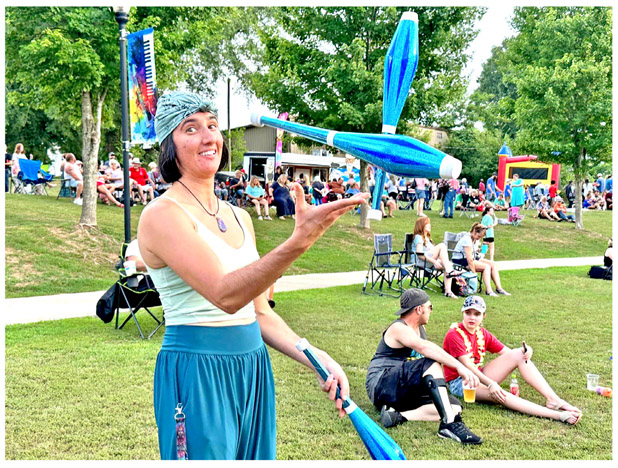 Vendors, inflatables, face painting and balloon artists will be available to attendees starting at 6 p.m., and the fun will continue with a kids’ bike parade at 6:30 p.m.
Vendors, inflatables, face painting and balloon artists will be available to attendees starting at 6 p.m., and the fun will continue with a kids’ bike parade at 6:30 p.m.
Potato sack races will be open to those in attendance at 7:30 p.m. and The wiffle ball home run derby will begin at 8 p.m., with prizes being presented to winners in four different age groups.
Extra parking for the event will be available at Ridgeland Drive Baptist Church and a free, hayride shuttle is available to and from Ponderosa Park.
Safe Summer Fun in the Sun

Summer is the season of sun-kissed memories – backyard barbecues, sandy beaches, bike rides and late-night stargazing. However, the warmer months bring unique safety challenges that can catch active families off guard if they’re not prepared.
From sunburns to scraped knees and dehydration to bug bites, summer’s surprises don’t have to slow you down. With a few simple precautions and the right tools on hand – like reliable first-aid essentials – you can make safety second nature and keep your focus where it belongs: on making the most of every sunny moment.
Here are a few smart, easy tips from the experts at CURAD to help your family stay protected from the sun, heat, water hazards and the inevitable bumps and bruises from outdoor play.
Shield Your Skin from Harmful Rays
The summer sun can be harsh, making it important to take steps to prevent sunburn,
You must be logged in to view this content.
Subscribe Today or Login
Building your summer scrape kit
A summer first-aid scrape kit can be a lifesaver for those inevitable bumps, bruises and blisters.
Keep your family’s kit in a waterproof case and in an easily accessible place, such as your car, pool bag or home first-aid cabinet. Make sure to keep it stocked with essentials such as:
• Antiseptic wipes for cleaning wounds
• Antibiotic or antimicrobial ointment to help prevent buildup of bacteria
• Bandages like CURAD Naturals Hydrocolloids with Aloe Vera to treat minor cuts,
You must be logged in to view this content.
Subscribe Today or Login
Understanding the significance of Juneteenth
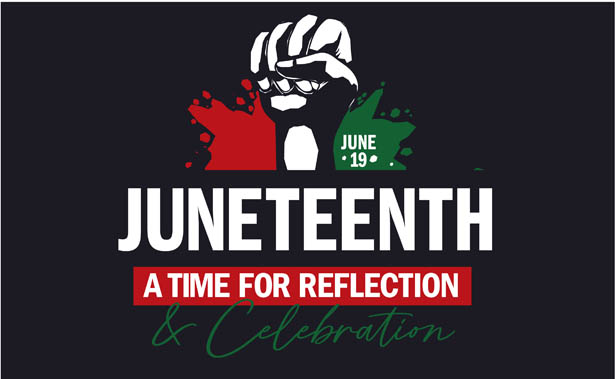
EASLEY — The public is invited to join the Pickens County America 250 Committee on June 28 for a rare Revolutionary War-era slideshow presentation by noted Pickens County historian Dennis Chastain.
Th event will take place at 3 p.m. at the Capt. Kimberly Hampton Memorial Library in
You must be logged in to view this content.
Subscribe Today or Login
Father’s Day — A history

On July 19, 1910, the governor of the U.S. state of Washington proclaimed the nation’s first “Father’s Day.” However, it was not until 1972, 58 years after President Woodrow Wilson made Mother’s Day official, that the day became a nationwide holiday in the United States.
MOTHER’S DAY: INSPIRATION FOR FATHER’S DAY
The “Mother’s Day” we celebrate today has its origins in the peace-and-reconciliation campaigns of the post-Civil War era. During the 1860s, at the urging of activist Ann Reeves Jarvis, one divided West Virginia town celebrated “Mother’s Work Days” that brought together the mothers of Confederate and Union soldiers. In 1870, the activist Julia Ward Howe issued a “Mother’s Day Proclamation” calling on a “general congress
You must be logged in to view this content.
Subscribe Today or Login
Great gift ideas for Dad
Father’s Day is right around the corner and that means many children, spouses and  other family members will be scrambling to locate the perfect gifts for the men in their lives.
other family members will be scrambling to locate the perfect gifts for the men in their lives.
Put away those coupons for neckties and remote control caddies. There’s a good chance Dad wants something a little less cliche and more in tune with his interests. If you think carefully about gift ideas, there’s bound to be something that will be a perfect fit.
Sports
If Dad follows a particular team or sport, gifts inspired by his love of a favorite team are
You must be logged in to view this content.
Subscribe Today or Login
How to make Father’s Day more enjoyable for Dad
Dad gets to be king of his castle at least one day during the year. Come mid-June,  children near and far scramble for ideas to treat their fathers to a special day and award him with gifts for being a role model, provider and confidante. Father’s Day activities should be centered around Dad’s interests. With that in mind, the following are some ideas to honor Dad or another special man in your life.
children near and far scramble for ideas to treat their fathers to a special day and award him with gifts for being a role model, provider and confidante. Father’s Day activities should be centered around Dad’s interests. With that in mind, the following are some ideas to honor Dad or another special man in your life.
- Sports Sunday: If Dad is a sports fan, his idea of spending a fun-filled afternoon very well may be cheeringYou must be logged in to view this content.
Subscribe Today or Login
EHS graduate Tate using bowling prowess toward college education
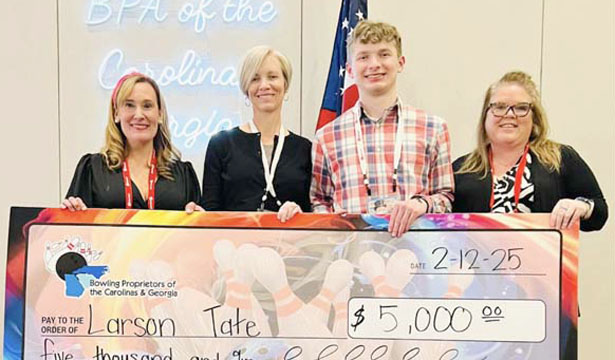
By Bru Nimmons
Sports Editor
bnimmons@thepccourier.com
EASLEY — An athlete from a young age, Larson Tate’s life changed when his 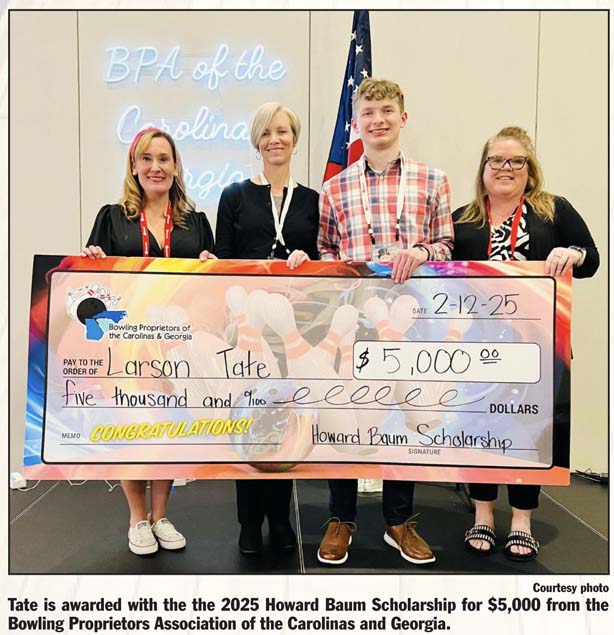 grandfather began to take him bowling after school when he was in the third grade. The recent Easley High School graduate found pleasure in playing games like baseball and basketball but found a purpose through bowling.
grandfather began to take him bowling after school when he was in the third grade. The recent Easley High School graduate found pleasure in playing games like baseball and basketball but found a purpose through bowling.
“I just wanted to keep going back,” Tate said. “I joined a league while I was still playing basketball and baseball, but I realized I just liked bowling much more.”
Since then, Tate has honed his game by becoming one of the best young
You must be logged in to view this content.
Subscribe Today or Login
Coming home
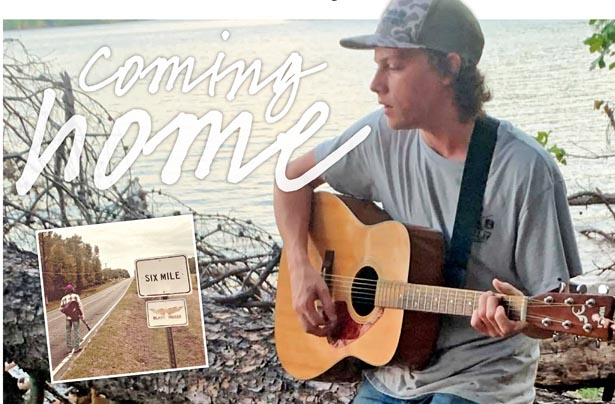
Rising country music star Whiten returns to Six Mile to perform at Issaqueena Festival
By Jason Evans
Staff Reporter
jevans@thepccourier.com
SIX MILE — After going viral on the internet and moving to Nashville, Tenn., a  musician from Six Mile will be returning for a hometown show this weekend.
musician from Six Mile will be returning for a hometown show this weekend.
Blake Whiten will be headlining the Issaqueena Festival on Saturday, May 17.
The Courier spoke with his parents, Windi and Matthew Whiten, on May 8.
 Blake’s mother said they bought him “his first little junior guitar” when he was 4 years old.
Blake’s mother said they bought him “his first little junior guitar” when he was 4 years old.
“By 12 or 13, he was pretty good,” Windi said.
As a kid, Blake tried to jump start his musical career.
“He tried to drop out of middle school to go to Nashville,” Windi said. ‘I wouldn’t let
him. I just laughed it off. I guess he really knew what he was going to do.”
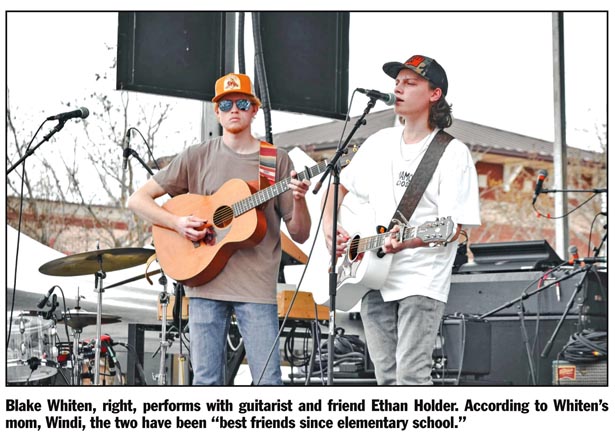 She said her son “got all that talent from his daddy.”
She said her son “got all that talent from his daddy.”
“My dad, my aunts all sang and played instruments,” Matthew said. “I play
You must be logged in to view this content.
Subscribe Today or Login



